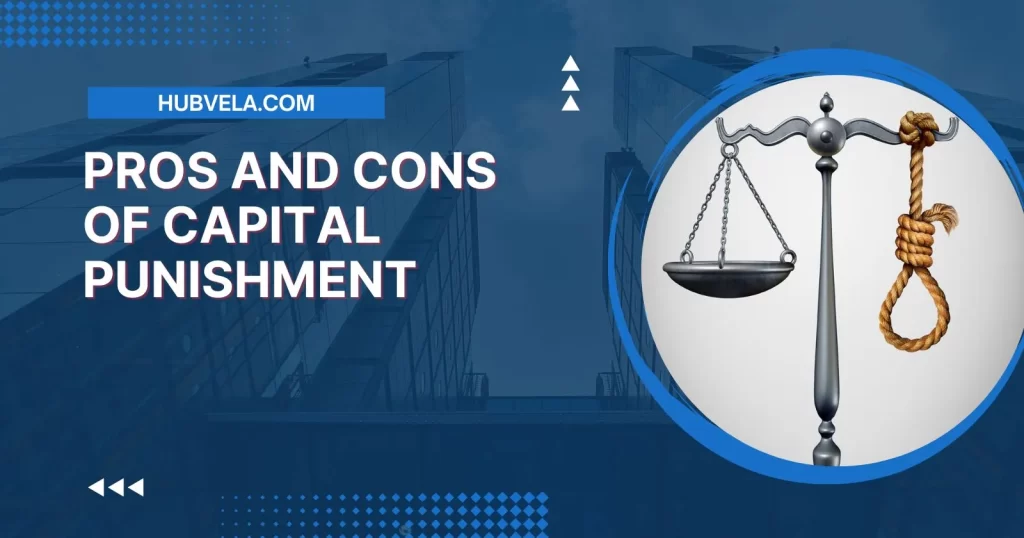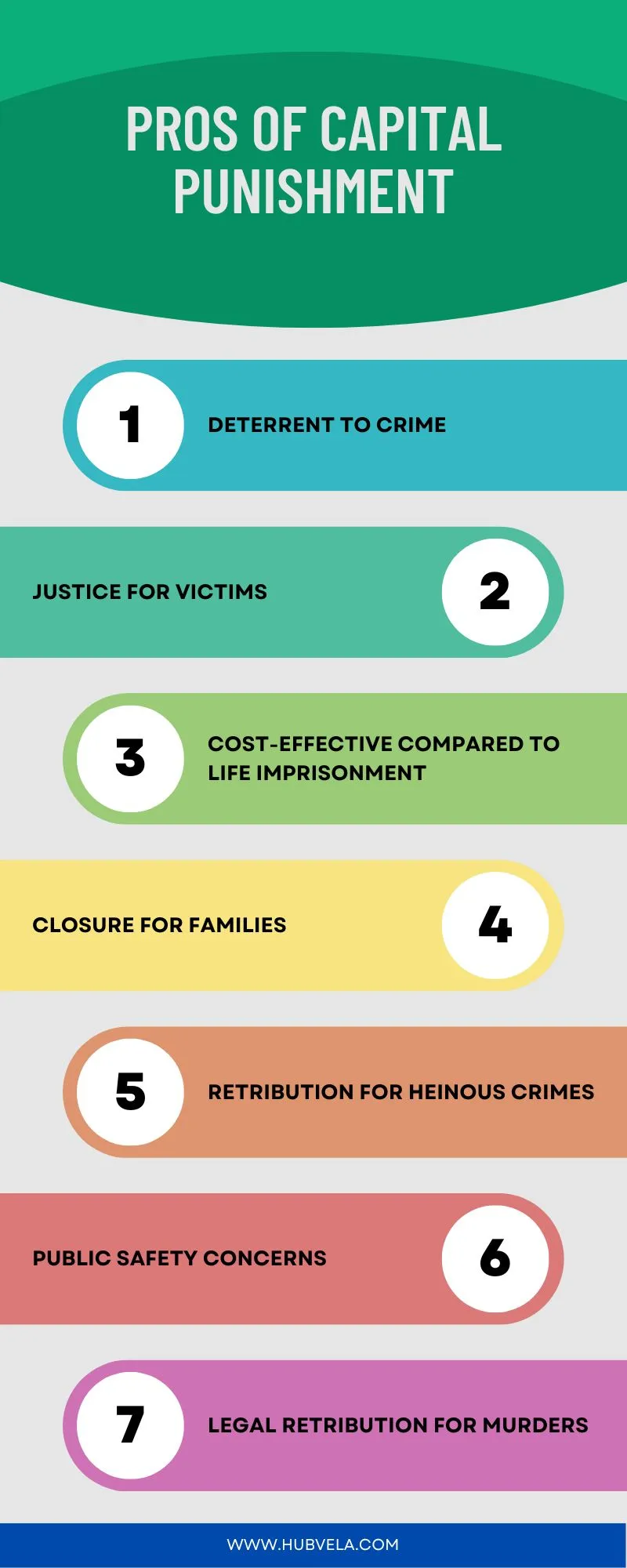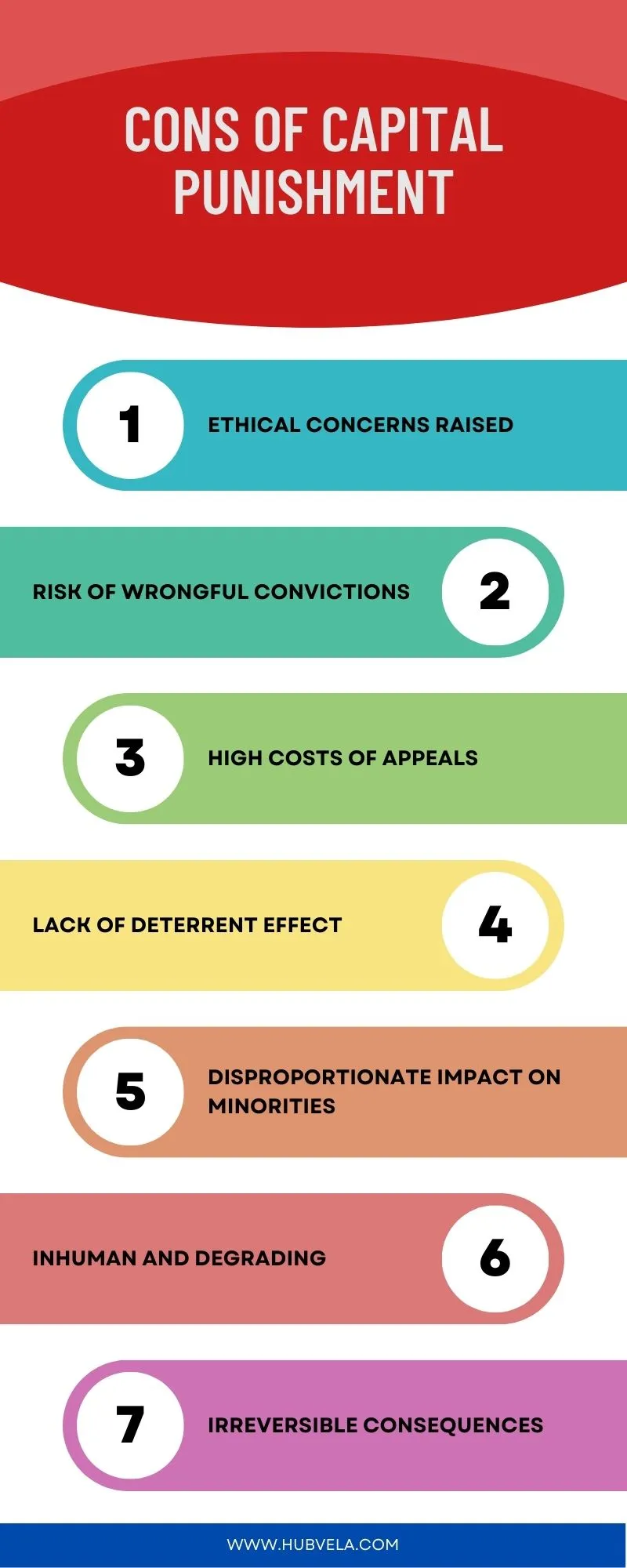Capital punishment, also known as the death penalty, is a highly controversial topic that has been debated for decades. It is a legal process where a person is put to death by the state as a punishment for a crime they have committed.
The use of capital punishment is still prevalent in many countries around the world, including the United States, China, and Iran. However, there are also many countries that have abolished it, such as Canada, Australia, and most of Europe.
In this article, we will explore the pros and cons of capital punishment, examining both sides of the argument to provide a comprehensive overview of this complex issue.

--Advertisement--
Pros of Capital Punishment
Capital punishment, also known as the death penalty, has been a controversial topic for decades. While some argue that it is a cruel and inhumane form of punishment, others believe that it serves as a necessary deterrent to crime.
We will explore the pros of capital punishment. From its potential to deter crime to its ability to provide closure for victims’ families, we will delve into the benefits of capital punishment and consider its place in modern society.

1. Deterrent to Crime
Capital punishment serves as a powerful deterrent to potential criminals, instilling a fear of severe consequences for committing heinous acts. Knowing that the ultimate penalty awaits those who commit the most serious offenses can dissuade individuals from engaging in such criminal behavior.
The fear of facing execution acts as a strong deterrent, potentially preventing crimes that could lead to loss of life or irreparable harm to victims. This fear factor can influence individuals to think twice before committing violent or heinous acts, ultimately contributing to a safer society.
The threat of capital punishment can serve as a significant deterrent in deterring individuals from crossing the line into criminal behavior that may result in the ultimate punishment.
2. Justice for Victims
Considering the impact on victims and their families, capital punishment provides a sense of closure and retribution that’s often sought in the aftermath of heinous crimes. Knowing that the perpetrator has faced the ultimate consequence for their actions can bring a form of justice to those who’ve suffered unimaginable loss and pain.
For many victims’ families, seeing the offender receive the death penalty can offer a semblance of vindication and finality, allowing them to begin the process of healing and moving forward. This closure can help survivors cope with their grief and trauma, knowing that society has taken a stand against such egregious acts and that the perpetrator will never have the opportunity to harm anyone else.
3. Cost-Effective Compared to Life Imprisonment
Opting for capital punishment over life imprisonment can be a more cost-effective solution for the criminal justice system. While the initial costs of a death penalty trial may be higher due to legal fees and lengthy appeals, the long-term expenses of housing, feeding, and providing healthcare for a prisoner for life can surpass the costs of carrying out an execution.
In cases where evidence is overwhelming and guilt is certain, opting for capital punishment eliminates the ongoing financial burden of incarcerating an individual for decades. By streamlining the legal process and avoiding prolonged imprisonment costs, capital punishment can potentially save taxpayers money in the long run.
This cost-effectiveness aspect is a significant consideration for policymakers evaluating the use of capital punishment within the criminal justice system.
4. Closure for Families
Transitioning from the cost-effective aspect of capital punishment, families of victims often find closure in knowing that justice has been served through the ultimate penalty. The emotional toll of losing a loved one to a heinous crime can be overwhelming.
In these situations, the finality of capital punishment can provide a sense of resolution and peace for the families. Seeing the offender held accountable in the most severe manner can help alleviate some of the pain and anger that survivors may experience. Closure is essential for healing, and for many families, knowing that the perpetrator has faced the consequences of their actions can bring a sense of justice and closure that may not be achieved through other means.
5. Retribution for Heinous Crimes
Retribution for heinous crimes serves as a fundamental justification for the implementation of capital punishment. When an individual commits a particularly horrific crime, society often feels a strong need for justice to be served.
Capital punishment provides a form of retribution that some believe is necessary to balance the scales of justice. The severity of the punishment is seen as a reflection of the severity of the crime committed. It offers a sense of closure and satisfaction to the victims’ families and the affected communities.
6. Public Safety Concerns
When considering capital punishment, one significant aspect to highlight is the potential impact it has on ensuring public safety. The execution of individuals convicted of heinous crimes serves as a deterrent to others who may contemplate committing similar acts. The fear of facing the ultimate punishment can act as a powerful deterrent, potentially preventing future crimes and protecting society at large.
Knowing that the most severe consequences await those who commit the most serious offenses can contribute to a safer environment for law-abiding citizens. By enforcing capital punishment for the most egregious crimes, the justice system sends a clear message that such actions won’t be tolerated, thus playing a role in maintaining public safety.
7. Legal Retribution for Murders
Have you ever considered how capital punishment serves as a form of legal retribution for murders?
For many, the imposition of the death penalty on individuals convicted of heinous crimes like murder is seen as a just response to the severity of their actions.
By carrying out capital punishment, society upholds the principle of ‘an eye for an eye,’ ensuring that those who’ve taken a life face the ultimate consequence for their deeds.
This form of legal retribution is believed to provide a sense of closure and justice to the families and loved ones of the victims, offering them a form of solace by holding the perpetrators accountable in the most severe manner possible.
Cons of Capital Punishment
Capital punishment, also known as the death penalty, is a highly controversial topic that has been debated for decades.
While some argue that it serves as a deterrent to crime and provides justice for victims and their families, others believe that it is a cruel and inhumane practice that violates human rights.
We will explore the cons of capital punishment and examine the reasons why many people believe it should be abolished.

1. Ethical Concerns Raised
Considering the ethical concerns raised about capital punishment, it becomes evident that the debate is centered on the fundamental principles of justice and human rights. The main ethical dilemma revolves around the irreversible nature of the death penalty. Ending a human life, even that of a convicted criminal raises questions about the sanctity of life and whether society should have the power to administer such punishment.
Disparities in the application of capital punishment based on race, socio-economic status, or geographic location highlight concerns about fairness and equality before the law. The ethical implications of potentially executing innocent individuals further complicate the moral justification for capital punishment. These concerns underscore the need for a thorough examination of the ethical framework surrounding the death penalty.
2. Risk of Wrongful Convictions
The risk of wrongful convictions in capital punishment cases highlights a significant flaw in the justice system, casting doubt on the reliability of verdicts and the irreversible consequences that follow. Despite extensive legal processes, errors can occur, leading to innocent individuals facing the death penalty. Mistaken eyewitness identifications, false confessions, and inadequate legal representation are just a few factors that can contribute to wrongful convictions in capital cases.
Once a person is executed for a crime they didn’t commit, there’s no way to reverse the irreversible outcome, making it a grave miscarriage of justice. The possibility of executing an innocent person underscores the moral and ethical dilemma associated with capital punishment and raises serious concerns about the fairness of the legal system.
3. High Costs of Appeals
Appeals in capital punishment cases can incur exorbitant costs, straining both the judicial system and taxpayers. The lengthy and complex nature of these appeals drives up expenses significantly. Legal fees, court expenses, and the cost of maintaining the convicted individuals during the appeals process all contribute to the financial burden.
These appeals can drag on for years, tying up court resources that could be used for other cases. The need for specialized legal professionals and extensive investigations further escalates the overall costs.
Ultimately, the high expenses associated with capital punishment appeals raise questions about the financial sustainability of pursuing death penalty cases and whether these funds could be allocated more efficiently within the judicial system.
4. Lack of Deterrent Effect
Transitioning from the challenges posed by the high costs of appeals in capital punishment cases, the lack of a deterrent effect stands out as a significant disadvantage of maintaining the death penalty. Despite the belief that capital punishment would deter others from committing similar crimes, studies have shown mixed results on its effectiveness as a deterrent.
The uncertainty surrounding whether the death penalty truly prevents heinous crimes raises concerns about its purpose and impact on society. The lack of concrete evidence to support the idea that capital punishment reduces crime rates raises questions about its overall effectiveness.
Without a clear deterrent effect, the justification for maintaining the death penalty becomes less convincing, leading to doubts about its role in deterring criminal behavior.
5. Disproportionate Impact on Minorities
Despite its aim to serve justice, capital punishment has been criticized for its disproportionate impact on minorities. Statistics show that minority groups, particularly African Americans and Hispanics, are more likely to be sentenced to death compared to their white counterparts. This racial disparity raises concerns about the fairness and impartiality of the criminal justice system.
Factors such as racial prejudice, inadequate legal representation, and socioeconomic inequalities play a role in this disproportionate impact. The overrepresentation of minorities on death row highlights systemic issues within the legal system that contribute to these disparities.
Addressing and rectifying these disparities is crucial to ensure that capital punishment is applied equitably and justly to all individuals, regardless of their race or ethnicity.
6. Inhuman and Degrading
The practice of capital punishment has been widely criticized as inhuman and degrading. The act of taking a person’s life as a form of punishment is often viewed as a violation of their basic human rights. The process of execution, whether it be through methods like lethal injection, electrocution, gas chamber, or firing squad, can be seen as cruel and unusual punishment.
The prolonged waiting periods on death row, uncertainty, and psychological anguish inflicted on individuals awaiting execution can be considered degrading. The dehumanization of both the condemned individual and those involved in the execution process raises ethical concerns about the morality of capital punishment. These aspects highlight the inhumanity and degradation associated with the practice.
7. Irreversible Consequences
With the inhumanity and degradation already highlighted, considering the irreversible consequences is crucial when evaluating the cons of capital punishment. Once a person is executed, there’s no way to reverse the decision if new evidence emerges proving their innocence. Mistakes in the justice system, though rare, can lead to irreversible tragedies.
The finality of death means that any errors made can’t be rectified. Families of the wrongfully convicted individuals are left to grieve for their loved ones with no possibility of closure or justice. The irreversible nature of capital punishment raises ethical concerns about the risk of condemning innocent individuals to death.
This irreversibility underscores the gravity of implementing such a permanent and irreversible punishment.
Conclusion on Pros and Cons of Capital Punishment
Overall, capital punishment has its pros and cons. While some argue it serves as a deterrent for heinous crimes and provides justice for victims and their families, others believe it’s morally wrong and can lead to wrongful convictions.
It’s important to weigh these factors carefully before forming a stance on the issue.
Ultimately, the debate over capital punishment continues to be a complex and controversial topic in society.


